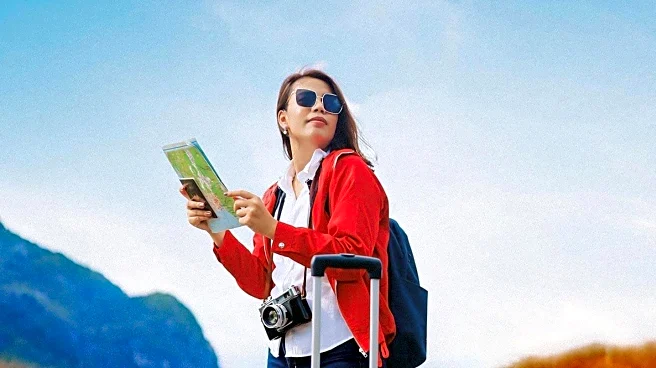What is the story about?
What's Happening?
Skyscanner has released its Travel Trends 2026 report, highlighting seven key trends that are expected to shape traveler behavior in the coming year. The report suggests that travel will become more personalized, with trips curated around individual passions and priorities. Among the trends identified are the integration of beauty rituals into travel itineraries, the rise of culinary tourism through local supermarkets, and the increasing popularity of mountain escapes for year-round serenity. Additionally, literature-inspired travel is gaining traction, with travelers seeking to reconnect and restore through book-related experiences. Solo travel is also on the rise, driven by shifts in dating habits and the desire to meet new people. Multi-generational family trips are becoming more common, as families seek to create lasting memories together. Finally, hotels are increasingly becoming destinations in themselves, with travelers choosing accommodations based on unique architectural and design features.
Why It's Important?
These trends reflect a shift towards more meaningful and personalized travel experiences, which could have significant implications for the tourism industry. As travelers prioritize unique and culturally immersive experiences, destinations and service providers may need to adapt their offerings to meet these evolving preferences. The emphasis on sustainability and responsible travel is also likely to grow, as travelers become more conscious of their impact on the environment and local communities. The rise of solo and family travel suggests a diversification of the market, with opportunities for businesses to cater to different demographic groups. Additionally, the focus on hotels as destinations highlights the importance of innovative design and hospitality in attracting travelers.
What's Next?
As these trends continue to develop, travel companies and destinations may need to invest in new strategies to attract and retain visitors. This could include enhancing the cultural and experiential aspects of their offerings, as well as leveraging technology to provide personalized travel experiences. The integration of AI and social media platforms in travel planning is expected to grow, offering travelers more tailored and efficient ways to organize their trips. Furthermore, the industry may see increased collaboration between travel providers and local communities to promote sustainable tourism practices.
Beyond the Headlines
The focus on personalized travel experiences could lead to a reevaluation of traditional tourism models, with a greater emphasis on authenticity and cultural engagement. This shift may also encourage travelers to explore lesser-known destinations, reducing the impact of overtourism in popular areas. The integration of beauty and wellness into travel itineraries reflects broader societal trends towards self-care and holistic well-being, which could influence other sectors such as hospitality and retail.
















